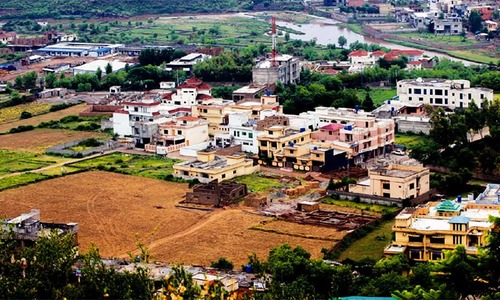ISLAMABAD: Inter-Services Intelligence (ISI) has been given another four weeks to clear a blocked portion of Khayaban-i-Suharwardy in front of its headquarters.
The direction was issued by a three-member Supreme Court bench led by Chief Justice Man Saqib Nisar, after Director Legal Defence Brig Falak Naz sought time, saying that while the major work of removing infrastructure and sensitive devices had been completed, minor work still required more time.
On July 6, the SC granted two months to open the road at the Aabpara junction. The ISI had closed off the road in 2008 after terrorist attacks on several important government buildings.
The chief justice recalled that ISI Counter Intelligence Director General Gen Faiz Hameed had appeared in person and assured the court that the encroachments would be cleared in two months. He observed that the ISI was an organised institution and should have cleared the road by now.
Justice Nisar also cited an example of a statue of Gandhi that was erected at such a place that it obstructed traffic. The Indian Supreme Court had intervened and ordered the removal of the statue to clear the road.
“Such is the sanctity of the right to movement,” he observed, adding that he needed to see the road restored.
SC orders constitution of committee to devise solution to regularise unchecked construction in Banigala
He also asked Mr Naz to establish a bombproof edifice around the ISI headquarters, or move them elsewhere. He recalled an earlier SC direction to remove encroachments from all the roads in the capital, and observed that the court would ensure the supremacy of the law at all costs.
In response to Mr Naz’ statement that the majority of the work had been carried out and time was needed for minor things, the chief justice asked what good an empty road served if it could not be used.
In its order, the SC recalled that the counter intelligence director general appeared before the court and undertook to remove the encroachments in eight weeks, and stated that Mr Naz had assured the court that substantial progress had been made including the removal of security walls. The court then granted a month for removal.
Banigala
The same bench also said on Tuesday that Prime Minister Imran Khan would be the first to pay the penalty when his Banigala residence is regularised, and called him a whistle-blower who highlighted unchecked construction in the area.
The chief justice also ordered the constitution of a high-powered committee consisting of Capital Development Authority Chairman Latif Akbar, the housing, environment, interior, local government and climate change secretaries and the Environment Protection Agency director general to devise a solution to regularise unchecked construction in Banigala.
Justice Nisar observed that almost 50 days have passed since the new government was formed, and the regularisation of the area should have been carried out on a war footing since Mr Khan, being the head of the executive, was in charge.
He said it was not the courts’ task to intervene in every matter, and regretted the lack of town planning that has resulted in unchecked housing societies discharging effluents and sewage into Rawal Lake and nearby nullahs.
For illegal construction on the bed of Korang Nullah, the SC ordered the regularisation of compoundable infrastructure, but not that which was constructed on the riverbed in violation of the law.
Additional Attorney General Nayyar Abbas Rizvi told the court that a 12 kilometre wall will be constructed around Banigala, 4km of which has already been built. It will be expanded by another 4km by November, and 100,000 saplings have also been planted, he said.
Funds to complete the wall have not been released, Mr Rizvi said, adding that five companies were responsible for encroachment in the area.
The Banigala case was taken up on a letter written by Imran Khan inviting the court’s attention towards unchecked and unplanned construction in the area, massive denuding due to large-scale tree felling and pollution of Rawal Lake by sewage.
Mr Khan had said that in the 15 years he had lived in Banigala, the botanical gardens from the Korang Road side had been nearly halved because of unchecked encroachment and the rapid depletion of greenery, as well as a number of multi-storey commercial buildings.
He had asked the SC to take notice of the proliferation of unregulated and unplanned commercial buildings in the area, as well as large-scale encroachment on the botanical garden and park.
Published in Dawn, October 17th, 2018














































